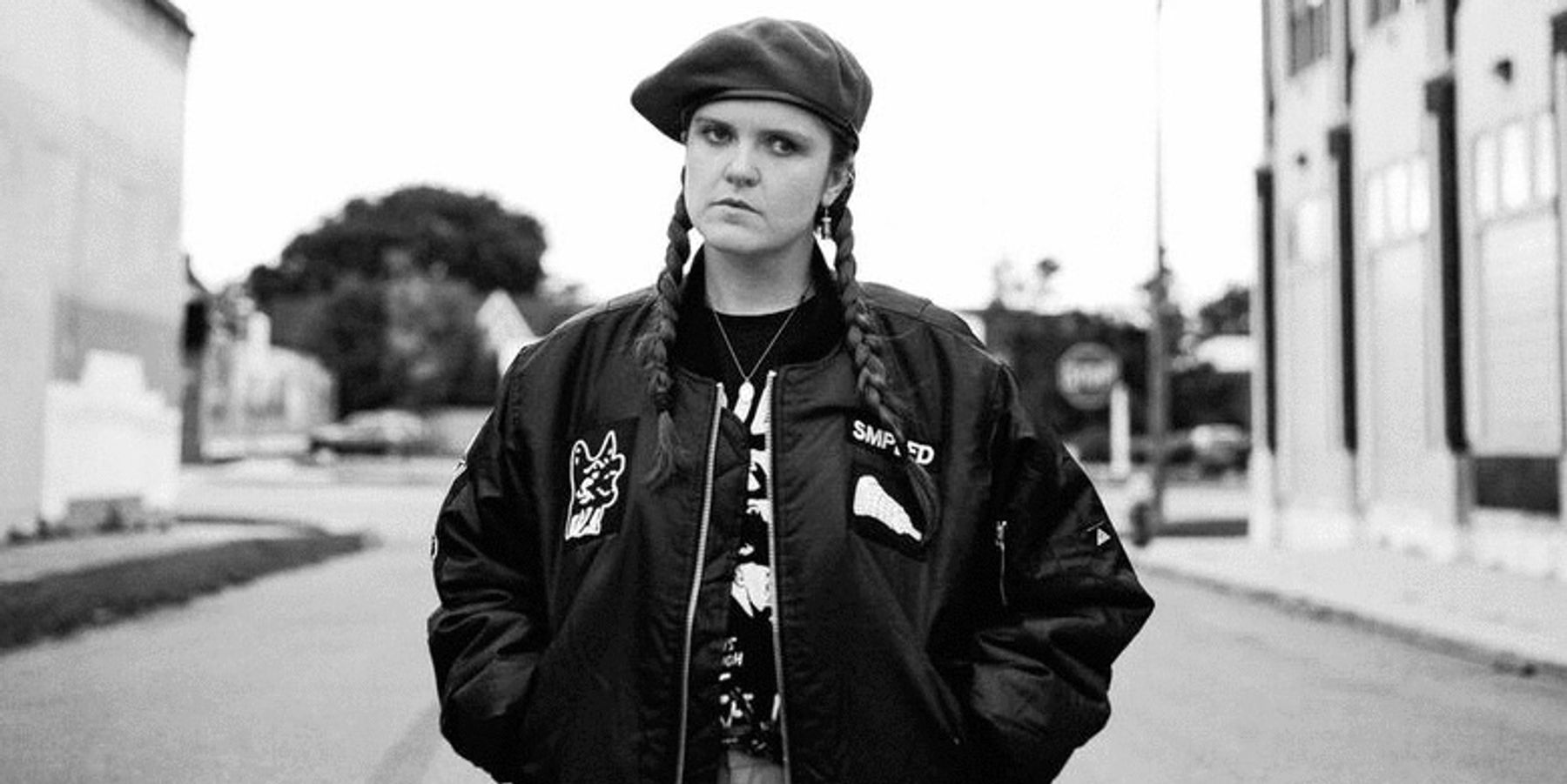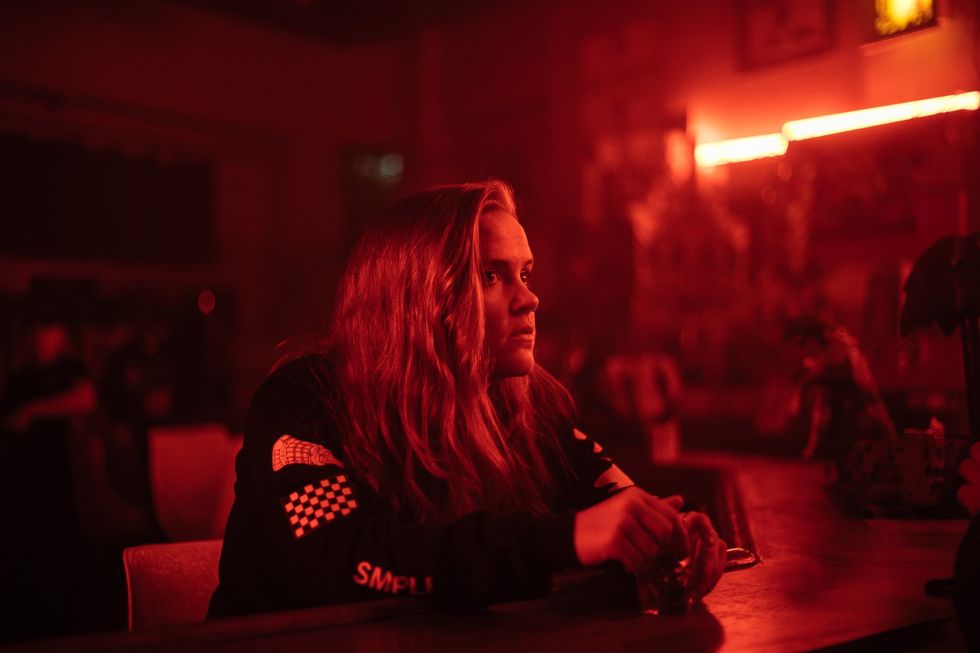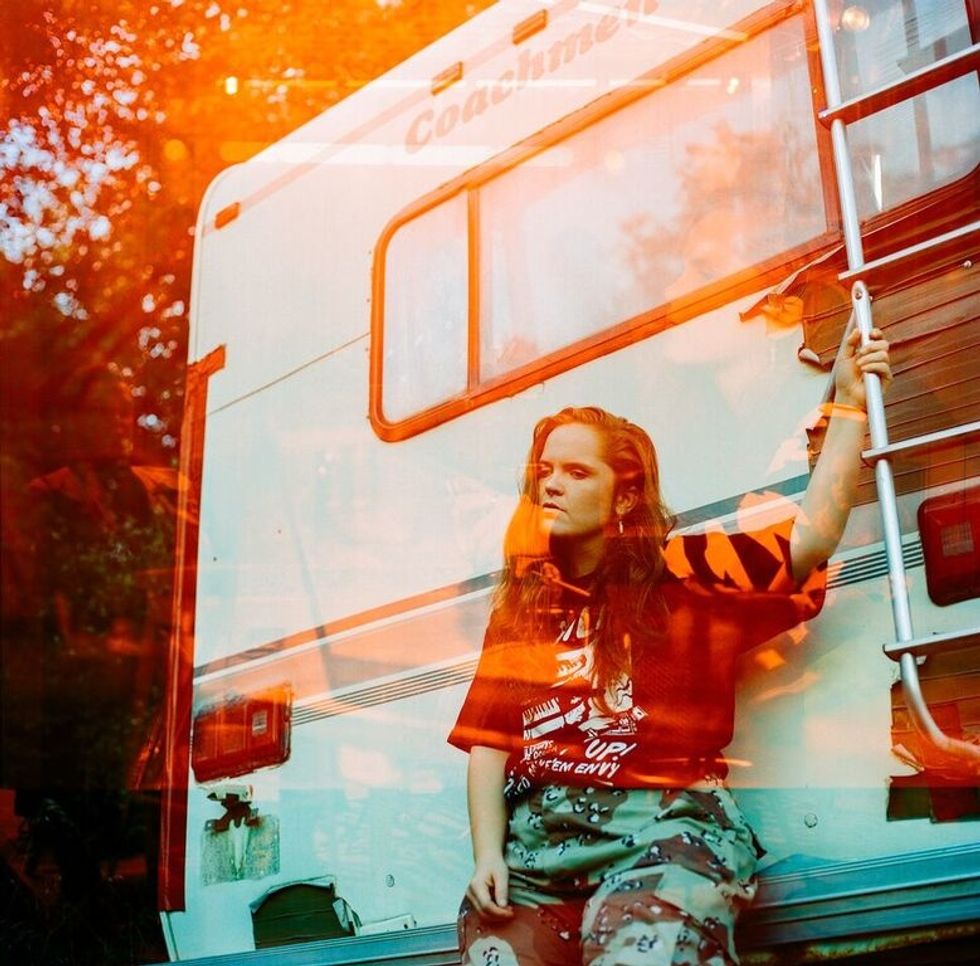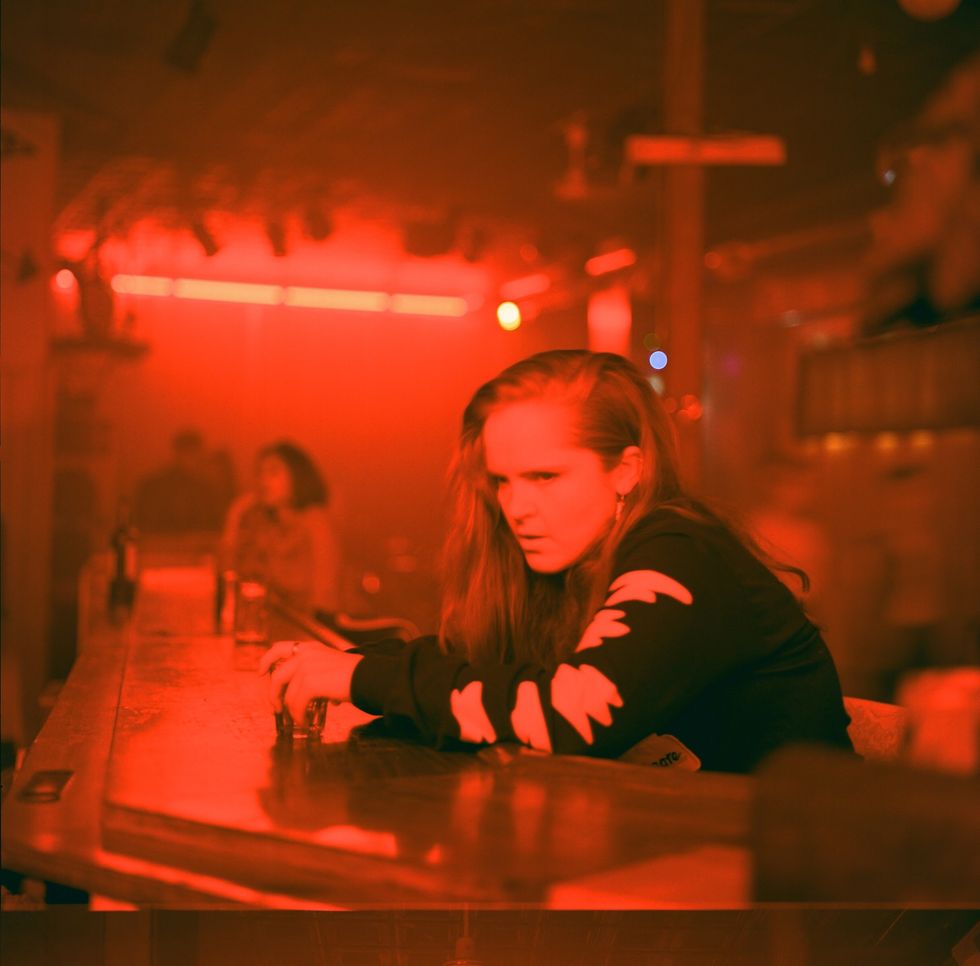
It's hard to find an artist as open-hearted as Flint Eastwood's Jax Anderson.
The Detroit singer-songwriter has found fans for her politically conscious, bombastic alt-pop bangers, like her triumphantly queer "Real Love," (which she wrote after her childhood pastor won an award for performing gay conversion therapy) and feminist pump-up "Queen."
But her indie-bred sound has transformed almost constantly since she started out in Detroit's DIY scene at age 12, growing steadily bigger, bolder and more pop-centric. She started Flint Eastwood as an alt-rock project while in high school, and quickly started scoring coverage beyond Motor City: she got an ESPN song placement, gigs alongside Foster the People, Misterwives, Betty Who and Pvris, and last year she landed a record deal with her dream label, Lizzy Plapinger's Neon Gold (Ellie Goulding, Christine and the Queens, Icona Pop, Tove Lo).
Despite her rapidly amplifying sound and rising pop-queen status, Anderson is fiercely loyal to the scene that made her, and to her own authentic, intimate experiences. Two years ago, identifying a need for more community in the Detroit music scene, she pooled money with her brother, Seth Anderson (also a musician who goes by Syblyng) and a couple of friends, Nicole Churchill and Garret Koehler, to found Assemble Sound: a DIY music collective and studio housed in a revitalized church in Detroit's Corktown neighborhood.
Assemble Sound is where Anderson wrote her candidly titled new EP This Is A Coping Mechanism For A Broken Heart over the course of 48 restless hours, in a desperate attempt to empty contents of her mind after she and her girlfriend of four years ended things.

The result of her purge is a dark but clean and catchy synth-pop collection with each of its six songs a cohesive chapter of her heartbreak. She's often as blunt as the EP's title, hurling out grief and anger ("Why you wanna go and hurt me?" "You can call me when you're sober") on anthemic choruses that repeat existential questions like litanies, while also managing to capture love's most depressing paradoxes: "I wish that you could love me/ I wish that I could heal you" she sings on "Many Mistakes." Anderson shows herself to us completely: broken, nostalgic, furious, lonely, resentful and hopeful, but always radiantly warm and honest.
This Is A Coping Mechanism is easily the rawest we've seen Flint Eastwood, but also the most expansive: a modern pop menagerie that's harder than ever to pin down. Anderson inflects her atmospheric synth-pop with R&B and hip-hop notes (courtesy of Assemble Sound collaborators Sam Austins, Siena Liggins, and Jaye Prime). Meanwhile there's Lana in her sorrow and syrupy delivery on "Many Mistakes," Charli in her shimmering hooks on "Hurt," Florence in the the folkiness that gives way to the beat on "Fire," Sia in the jitters of "Sober" and HAIM in the breathiness of "Summer Wine."
Today, PAPER is exclusively premiering this This Is a Coping Mechanism For a Broken Heart. We sat down with Anderson to talk Assemble Sound, learning to love pop music and preaching vulnerability.
How and when did music become your career?
I've been writing music since I was a little kid. Basically, both of my parents are very musical, they met when my dad was a part of a traveling choir that went to my mom's po-dunk town church in the middle-of-nowhere Alabama. Music has always been in my blood, so I would say around high school is when I started writing music with my brother who goes by Syblyng. He produces all of my tracks. I've been doing music full time for about two years now, and it's been great. It's been a really good time.
Tell me about what Assemble Sound is doing, and what that community is like.
I mean, Detroit is one of those places where people forget how many genres were birthed out of it. We have Motown, garage rock was born in Detroit: all of these crazy influences. A lot of the times when people pop out of Detroit it's because they're creating their own genre. It's always been this really good community of people that encourage you to do what you want as an artist rather than go with what the trend is. That's always been a really inspiring thing about Detroit with me. A couple years back, I just wanted to get together and help the Detroit scene and help musicians that were coming to Detroit and give them a space to be able to record and meet other musicians and work together, so we pooled our money together and bought this church from the 1870's and created Assemble Sound, which is basically a collaboration studio space and rehearsal space and a whole bunch of other things that we're adding in the next year that's just open to the community and that [facilitates] people being able to work together. I think that the best art is made by multiple minds instead of just one, and I love collaborating with people and working with other people.
It makes sense that Detroit is such a fertile space for starting new sounds and genres. New York has that reputation, but it sort of feels like you have to be doing this one really trendy thing to get noticed. I think I read that Patti Smith has said that New York is dead, and that artists should find other places now.
I think cities go through a cycle, and right now Detroit is definitely at the beginning of something great. Granted, there have been amazing musicians that have stuck around this entire time, and they're like OG legends of the music industry that just never left Detroit, which also makes it a spectacular city in that you can just be around and run into some of your heroes randomly. You'll just be at a jazz bar and someone will point someone out to you. It's chill — celebrity culture doesn't really exist in the scene of Detroit, which is cool, so it's just like everyone's on the same field. There's a feeling of "Yo, you make dope shit? I make some stuff, let's get together and see what we can do." Patti Smith's right, they're creative! Let's go, get Detroit!

So this album was created while you were going through a crisis. Do you often find yourself really creatively generative when you're struggling?
I'm a pretty introspective person, I'm always trying to process things on my own, and my main way to process things externally is through art. All of my projects are about main events that happened in my life. My first EP, Small Victories, was about the passing of my mom and my last EP was about purchasing Assemble and getting involved in a lot of artists' lives and really investing what I have in other people. And then my last single "'Real Love" was about the church that I grew up in and learned how to create art in, where I learned how to do music, video, photography. They held a gay conversion therapy workshop and it was this bullshit of telling girls that they're flawed, and fucked up and I felt like I needed to write a song about that.
I've never really written about love previous to this, and I've never written about relationships because I felt like I really didn't have much to say about it, but with this I felt like I needed, for my own sanity, to write something about it.
You've said that you "preach vulnerability." Can you tell me what that means to you?
I think there are a lot of aspects that have made us shy away from vulnerability. You have the cliche that technology is a big reason why we're not vulnerable anymore, because we're all very disconnected and we only see the surface, but the ultimate thing you can do as a human being is to be connected to other people and to love other people, and to really invest in other people. For me, the best way of doing that is to be vulnerable, and you can't really expect vulnerability from others if you're not willing to be vulnerable yourself. That's the most terrifying thing as a human in itself, is to be vulnerable. It's this concept of allowing yourself to show your flaws, and that's so scary. Once you actually open yourself up to it, and once you actually get into the rhythm of it where it's not this scary thing it becomes a very safe place, and for me, I feel the more vulnerable I get, the more real my relationships become. The more real the people around me are. It's this ripple effect where it's one spot and it just goes to everybody. I think it's so important for people's mental health, I think it's is so important for people just existing. It's definitely a stigma where people are just afraid of it, and people tend to shy away but it's really something that you should not be afraid of.
These songs are so incredibly personal. Is it strange to have collaborators join you on something so intimate?
That's where the vulnerability comes into play [laughs]. For me in all my sessions, I have an open door policy, where I typically don't ever close the door on my studio, I just have it open for anybody to walk through. And the agreement is if you're going to be there, know that it's gonna get honest, and know that it's gonna be vulnerable, and know that you might feel awkward because it's so honest and vulnerable. With everyone that I write with, I feel the most connected to them because, quite frankly, they know all my secrets. Because whenever you're in a session, like there's really nothing that you can hide. It becomes a bullshit song if you aren't authentic with everything. I think authenticity in art is the most important and people can sniff it from a mile away. I don't feel comfortable releasing something unless I was 100% honest and vulnerable about it. It's been really cool to see the artists at Assemble specifically, kind of taking on that mindset as well, of just like, we're all vulnerable together, we're all telling each other how we honestly feel. And it's the most important community that I've ever had. It's a really beautiful thing when you find a space where you can honestly and truthfully be yourself.
I guess it's kind of like a feedback loop, where you're able to do that because you're in this space, but also having those really raw experiences of creating art also strengthens the community.
Yeah for sure, it's definitely a feedback loop. That's a great way of describing it. It's just a domino effect, in that the more you reveal about yourself, the more other people reveal, and the more comfortable that each of you feel. And the more you realize that "I'm not alone in most of the shit that I'm dealing with," that's a comforting thing.
Is it scary to release music that's so personal?
I mean, for me as an artist I've always believed in creating things that are authentic and true to myself. 'Cause all I can do is speak my own truth, and so, whenever I'm writing songs, I do what matters to me and I do what's on my soul and on my heart. There's so many people in the world that I'm sure some people will connect with what I'm dealing with because, you know, humans are humans and we all have things going on. Everybody has different experiences but I'm sure there are people who will share mine. It's obviously a little uncomfortable being vulnerable to a certain extent and it can be scary at times, but for me I'm not thinking about that, I'm thinking about how I can make my art the most genuine and authentic that it can be.

How would you characterize this record in how it relates to your past music?
This record was written in such a short amount of time, it was written over like a 24-hour period. We just had a set of synth sounds and I just went to my brother Seth, and I said "I feel really sad, like I feel really, really sad and I need to get some stuff off my chest. We need some sad music." So he always has his subset of sounds that are just like dedicated to the days that I had. And a lot of them are just dark synth sounds. But I get influences from everything that I listen to. And I'm always listening to every type of genre. Detroit is like... so many different types of music. Techno, motown and garage rock are so opposite from each other, but they're all just in the culture of the city, so I'm sure you can hear a lot of different types of music in the EP.
What are some of your favorite artists right now? And who did you grow up listening to?
I mean I grew up a lot on like Earth, Wind and Fire, and like that '70s kind of vibe. I grew up on a lot of pop music that my parents had on the radio, I love the Spice Girls, stuff like that. And then it wasn't until high school that I got into more like Arcade Fire and Sufjan Stevens and like folk scene things, and I got into garage rock and I got into... I didn't start really loving pop music until later on. And that's a deep dive, man, that's a fun dive whenever you really fully embrace pop music -- it's like, "Oh shit, this is great."
I really relate to that! I used to think pop music was bad because, like, boys and my dad told me so.
Yeah! Yeah man! I feel like I had that moment. I moved to Georgia for a hot sec, on the Appalachian trail. There was nothing but the radio and everyone just listened to pop music and it was this eye-opening experience of like "Oh, I get it now." I feel like everybody has to have this moment of like, "Oh, pop music is good!" I love pop music.
With regards to pop in particular, I wanted to talk about what it's like to be a queer artist in music right now.
It's a fantastic time to be a queer artist in general! Honestly, it's dope being queer anytime. Like being yourself, and being able to love yourself fully enough to be who you are and not feel like you have to be something you're not is just such a beautiful thing and I think it's a great point in culture that there are artists like Troye Sivan or King Princess... there's just so much out there now. It's amazing. Like when I was growing up we didn't have anything. So to be able to see all of these queer artists that are so proud and so good at what they do is just... I'm just so proud of my community, it's so incredible!
I've found a really good community of other queer artists to work with. I work a lot with this artist named Sienna Liggins who's featured on the project — she co-wrote a lot of it with me. Just fantastic queer artists. I'm starting to work with this other queer artist named Chong the Nomad and it's just like, man! Even the underbelly, independent of the queer community, is just so fantastic. The next generation is amazing. I'm so pumped for it.
Photo courtesy of Zach Hagy / @zach.hagy
From Your Site Articles